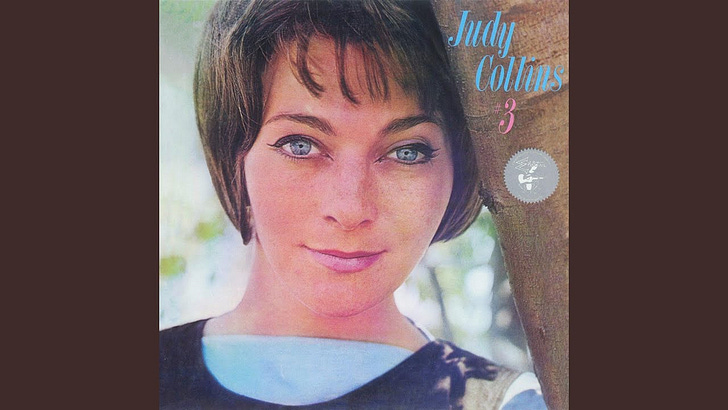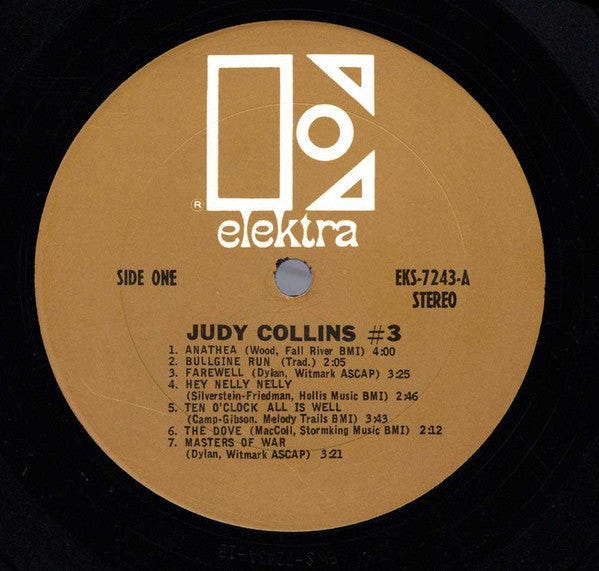"Masters of War" by Judy Collins (1963)
My favorite protest songs from the 60s and early 70s
This is the second in a series of protest songs from the sixties and early seventies that I’m sending out while taking a break from researching and writing.
The first song yesterday was “Blowin’ in the Wind” by Bob Dylan.
Today we have another Dylan song, transformed into something even more profound by the voice of Judy Collins.
Protest song of the day
At the time of releasing “Masters of War” in 1963, Bob Dylan explained that “‘I've never written anything like that before. I don't sing songs which hope people will die, but I couldn't help it with this one. The song is a sort of striking out... a feeling of what can you do?’” 1
He’s talking specifically about the final verse in which the singer hopes for the death of the master of war. You can read the lyrics on his website.
Later, looking back in 2001 — right before 9/11! — Dylan put the song into context, saying that it “‘is supposed to be a pacifistic song against war. It's not an anti-war song. It's speaking against what Eisenhower was calling a military-industrial complex as he was making his exit from the presidency. That spirit was in the air, and I picked it up.’”2
Although it’s been recorded by a number of artists over the decades, for me Judy Collins brought an entirely new meaning to it as a woman of childbearing age (in 1963) outraged by the threat to her as yet unborned and unnamed baby from the fear of bringing a child into a world at war.
The loss of generations of men and of one’s partner is, to me, also a specter behind these lyrics about the threat to bringing new life into the world — for one’s self and for other women, but also with significant reverberations and consquences down through the generations. (My grandfather was reportedly never the same after being in the trenches in World War I, nor my cousin after serving in Vietnam.)
As you’ll notice, Judy ends the song before the contentious final verse. But by the penultimate verse, the song as she sings it and as the musicians play it — arranged by soon-to-be Byrds’ co-founder Roger McGuinn — has become sharper and more urgent, and the threat to the soul of the master of war seems exactly the point.
What also strikes me as so right about this is the mental image of the singer as a beautiful young woman in the prime of life, as such a symbol of fertility, procreation, and the nurturing of new life, charging old men — the masters of war — with the denial and destruction of life on earth. It adds an emotional depth I find compelling.
Not to mention, there is the jarring juxtaposition of this beautiful pitch perfect soprano voice singing about the horrors of war.
Let me know your own thoughts and reactions in the comments.
Song credits
Songwriter - Bob Dylan
Musicians (album):
Judy Collins – guitar, keyboards, vocals
Jim McGuinn (later Roger) – second guitar, banjo
Bill Takas – double bass
Technical (album):
Mark Abramson – co-producer
Jac Holzman – co-producer
Jim McGuinn – arrangements
Hentoff, Nat (1963). The Freewheelin' Bob Dylan (Media notes). Bob Dylan. New York: Columbia Records. (Retrieved from Wikipedia, August 26, 2024)
Gundersen, Edna (2001-09-10). "Dylan is positively on top of his game". USAToday. Retrieved 2011-01-27. (Retrieved from Wikipedia, August 26, 2024)





I think what makes Dylan‘s songs so brilliant and evergreen is how malleable they are to the person or band that interprets it.
To calm the savage beast...